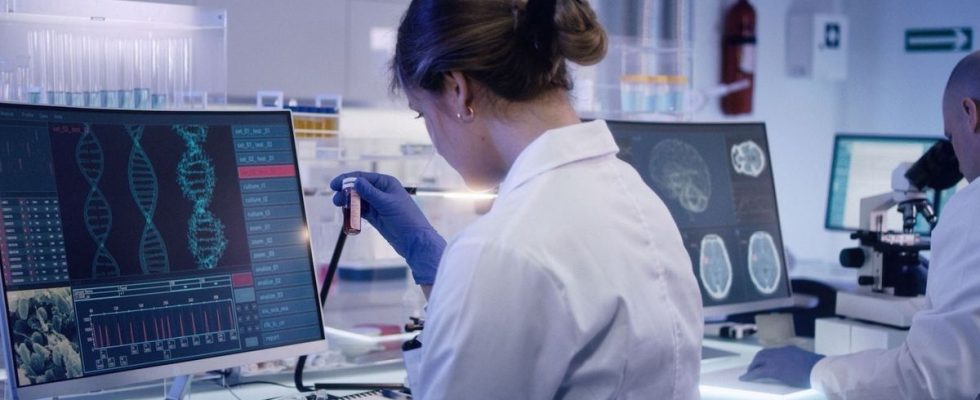Published on
Updated
Reading 2 min.
The first treatment using Crispr molecular scissors in a blood disease was recently authorized in several countries: this advance “opens the door” to other therapies relying on the genome – all of the genes – to combat complex pathologies.
“Everyone is interested in how pharmaceutical companies seek to use“the technique of molecular scissors and other processes of genetic modification of cells, underlines Clarivate, a company specializing in scientific data.
The treatment which was authorized at the beginning of February by Brussels – and which is already authorized in other countries – is called Casgevy. It is based on Crispr technology (pronounced “crisper”), a revolutionary tool invented in 2012 which modifies the patient’s faulty gene. It won the Nobel Prize in Chemistry to the Frenchwoman Emmanuelle Charpentier and the American Jennifer Doudna in 2020.
Casgevy was developed by the American laboratories Vertex Pharmaceuticals and the Swiss-American Crispr Therapeutics to treat patients with rare hereditary blood diseases, sickle cell anemia and beta thalassemia.
British health authorities were the first to approve it for these two diseases, in November 2023. Their American, European and Saudi Arabian counterparts followed suit this winter. The European Commission published its marketing authorization decision on February 12.
Expensive treatments
These permissions “open the door to other applications of Crispr therapies in the future to potentially cure many genetic diseases“, estimates British geneticist Kay Davies, from the University of Oxford.
But given the cost of these therapies — $2.2 million per patient for Casgevy taken in a single dose — the challenge will be to make them accessible on a global scale, she adds, like many others. other scientists.
“This treatment will not be able to supply low and middle income countries“, agrees Professor Simon Waddington, specialized in gene therapy at University College London (UCL). This is not “not a medication that can be easily injected or taken in pill form“.
The patient’s cells are modified using Crispr and then transplanted into the patient.
“We remain cautious about the long-term effects of this technology which is in its infancy“, underlines to AFP Marina Cavazzana, doctor at Necker hospital in Paris and renowned researcher in gene therapy.
In this “revolution in genetic tools made available to treat patients, other techniques appear using +improved Crispr+“to correct hereditary or acquired diseases, even cancers,” she adds.
2,000 gene therapies
Crispr is not only a means of modifying the DNA (all of the hereditary characteristics of a cell) of patients: it can be used for all living organisms – bacteria, plants, animals – and help in diagnosis diseases, Mario Amendola, research manager at Généthon, told AFP.
Other applications are at the research stage, such as the possibility of “modify the DNA of animals to make organs compatible“with humans, or”modify the DNA of mosquitoes to eradicate malaria“, he adds.
In 2019, eight gene therapies were available worldwide to treat patients.
In 2023, 27 gene therapies (including genetically modified cell therapies) were approved and around 2,000 under development, according to figures published in October 2023 by Citeline, a pharmaceutical service and consulting company.
The value of this market could reach $80 billion by 2029, estimates GlobalData, a data and analysis company.
But “88% of treatments linked to the Crispr technique are in early stages of development and it is therefore unlikely that we will see another approval in the near future“, analyzes Jasper Morley, expert at GlobalData.
Gene therapies require very significant investments. “Their colossal development and production costs, the risk of unsuccessful clinical trials and pressures on prices and reimbursements will continue to weigh on these innovations.“, adds the analysis firm.
